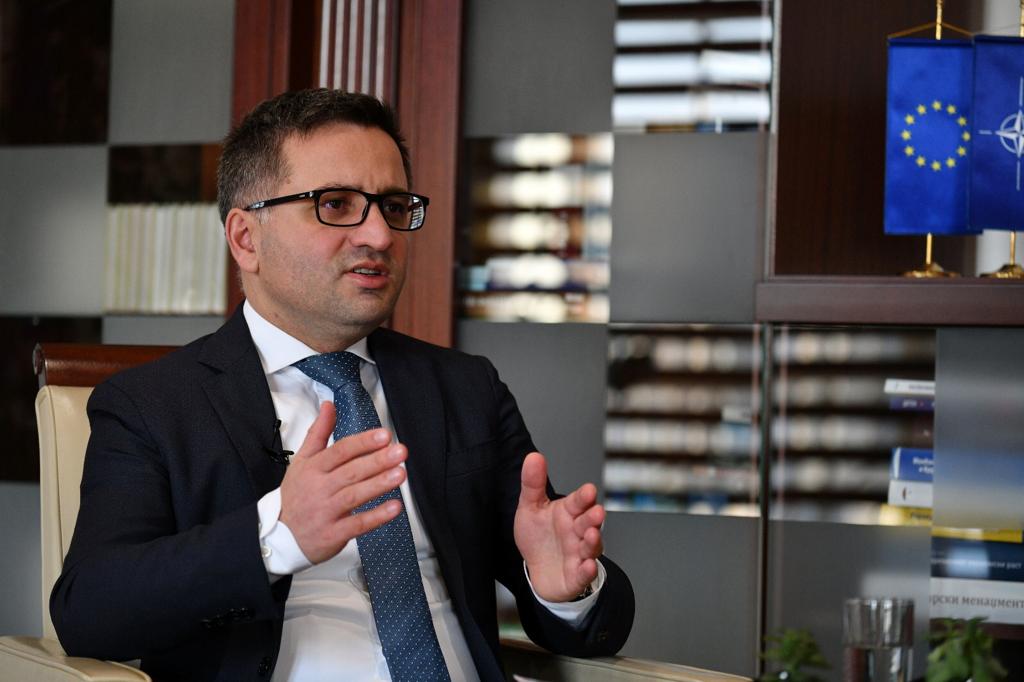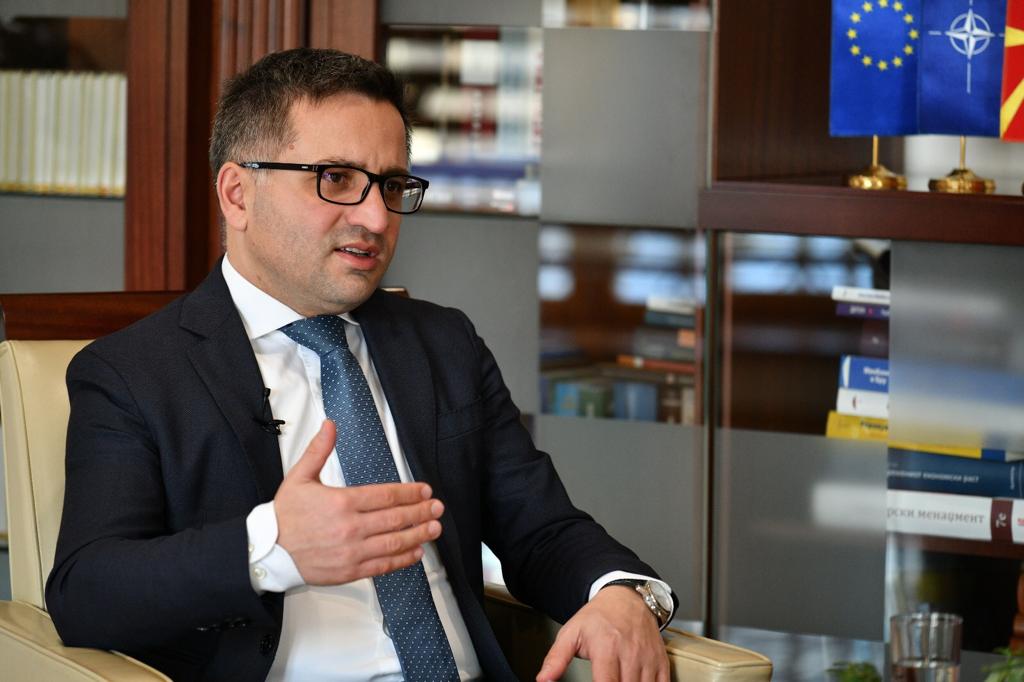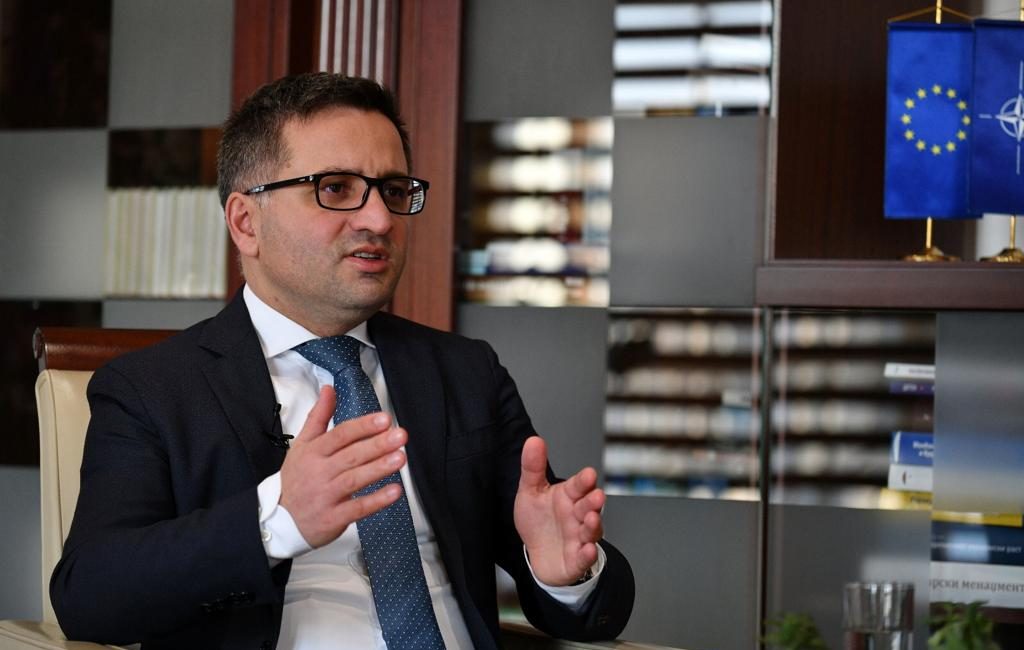
- Year of Economic Recovery Amid Still Present Challenges
29th December 2021, Skopje – There is a saying that an optimist stays up until midnight to see the New Year in, while a pessimist stays up to maker sure the old year leaves. From today’s perspective, I believe we have many reasons to be optimists. In my estimation, 2021 is ending with significantly improved health and economic situation, with a solid economic recovery and better prospects for the future, amid still present challenges, such as the energy crisis and the new virus variants.
This year has been marked by the fight against the pandemic and the support geared towards economic recovery. Preserving the health and saving the lives of the citizens, while supporting the most affected sectors and the vulnerable categories of citizens, remained to be the top priorities. In times of crisis, reaching its peak in the first half of the year, having a huge impact on the daily lives of people, as well as the usual economic operations of companies, the prompt and targeted response by the Government was indeed necessary. Therefore, we continued to implement some of the economic sets of measures adopted last year, thereby introducing additional two sets of measures, which total support geared towards the economy in the form of direct support for companies and citizens, guarantees and tax incentives, amounted to EUR 1.2 billion, or around 11% of GDP.
For the purpose of revitalizing the economy affected by the crisis, under the fifth and the sixth set of measures introduced in 2021, around EUR 185 million was allocated, as additional support to the business sector and the vulnerable categories. Under the various measures, financial support was provided for wages to the most vulnerable categories, as well as for boosting the liquidity, including the interest-free loans, as well the support extended for the export activity and the targeted sectors being most affected by the crisis. Positive effects rom the respective polices were also recognized under the latest IMF Mission Report, noting the well-designed fiscal measures cushioning the economic impact of the pandemic, keeping the jobs and protecting the most vulnerable, as well as the well-designed 2022 Budget, in support of providing an envelope to allow a flexible response to pandemic-related challenges.
This, coupled by other policies implemented by the Government in support of economic recovery, led to attaining the real economic growth rates of 13.4% in the second quarter and 3% in the third quarter of 2021, by which, the cumulative growth accented for 4.6% in the first three quarters. This growth was mostly driven by the stronger retail and wholesale trade, picking up by 15.9%, with services growing by 5.4% as of the first three quarters of 2021 inclusive compared to 2020. What we expected by the end of the year is for the positive developments to continue and to conclude the year with 4.1% economic growth as per the projections, with the possibility to exceed it.
At the end of the year, we faced an additional difficulty, i.e. global increase in prices of energy sources and primary products. The energy crisis, which has shaken markets globally in even the most developed countries, has resonated with a mix of factors triggered by the rising demand in the post-pandemic period, the ambitious green agendas of large countries, as well as the geopolitical interests. In the light of such context, by having no chance to impact the global price trends of these products, the Government intervention as an adequate response thereto, speaks in favor of our continuous committeemen to preserving and improving the living standard of the citizens. Thus, we ensure that economic growth becomes more inclusive with many as possible citizens benefiting therefrom.
Bu having provided a liquidity support of approximately EUR 100 million for the state-owned energy company ESM (Power Plants of North Macedonia), we provided for mitigating the consequences from this global crisis. In addition, to the end of supporting the living standard in July 2021, we introduced 5% VAT preferential tax rate on electricity of households (being significantly reduced compared to the previous 18%, which rate is envisaged to be again applied as of July 2023), thus having positive impact in terms of cushioning the consequences of this crisis on the households. Moreover, financial support of Denar 1,000 per month for covering the heating costs was provided to the socially vulnerable categories, thus helping around 35,000 families and 9,000 pensioners with lower income. We attentively monitor the developments in the energy sector, with the fiscal policy ready to respond timely, so as to mitigate the impact from this global energy shock.
- Inclusiveness, International and Regional Experience in Making Credible Economic Policies
The lessons learnt from the crisis is that, amid global economic crisis and challenges, exchange of experience, coordination and inclusiveness are the key factors in making efficient and sustainable policies. Different views and experience make a significant contribution to this process. In general, principles of comprehensiveness and inclusiveness are significant when designing policies and reforms. In such spirit, this year, we organized the first Annual Conference of the Ministry of Finance within Skopje Economic and Finance Forum (SEFF), with the focus being placed on economic recovery in the post-pandemic period. In the presence of high-level government officials from the country and the region, international financial institutions, representatives from the business sector, the broad political spectrum and academicians, we had opportunity to discuss the major future challenges, as well as to bring forward significant recommendations, being already incorporated in our strategies, plans and policies. As a part thereof, and in order to reinforce SEFF, within the year-end meetings with former finance ministers, an initiative was launched for establishment of a Council of former finance ministers t within SEFF (on a voluntary basis) in the capacity of an expert body, focusing on the topics under the Annual Conference attended by senior officials from international institutions and countries in the region. We remain committed for SEFF to grow into a traditional and recognizable regional platform for disusing the challenges and the opportunities in making credible economic policies, which will contribute to greater inclusiveness and better quality.
- Support for the Economy and Accelerated Growth via Prudent Public Finance Management
Rising financing needs to support those most affected by the crisis and the aggravated economic conditions led to the need for creating additional fiscal space, via the borrowing and by prioritizing the costs. During this process, we were guided by the principles of maximizing the effects, while taking into account the costs and the public finance sustainability.
Eurobond issued in March 2021 was a key recognition of such efforts. Historic low interest rate of 1.625% in times of great global uncertainty spoke in favor of the confidence the best informed market participants, i.e. the international institutions, placed in the public finance management and the economic prospects of our country. Funds amounting to total of EUR 700 million were used to refinance the Eurobond issued in 2014, with an interest rate of 3.975%, amounting to EUR 500 million. This means that in seven years, which is actually the maturity period of the new Eurobond, savings in the amount of EUR 82.3 million will be generated therefrom. Remaining EUR 200 million was used as budget support, which are expected to produce multiplied economic value in relation to the cost to be paid therefor, since the economic growth is expected to outpace the Eurobond interest rate. In addition, if one takes into account the higher inflation rates projected in the EU, the real costs for this Eurobond will be additionally reduced.
Public investments, i.e. capital expenditures are also a channel through which the state actively participates in the allocation and reallocation of resources in accordance with the set strategic goals, by considering the social component and other market and non-market principles, upon which our development policy is based. Thus, we actively contribute to stronger economic growth, which will, in turn, bring about a better quality of life of the citizens. In fact, the great support, which the state provided during the pandemic was also reflected in the final public consumption, picking up by 3.3% on cumulative basis in the first three quarters of this year, following the strong growth in 2020.
In this area, despite the difficulties caused by the pandemic, efficient management therewith and the new CAPEF mechanism geared towards more efficient capital expenditure execution, have yielded the expected results. In fact, as per the latest available data, i.e. capital investments are higher by 40% compared to the same period in the previous year. This means that capital expenditure execution amounts to approximately EUR 370 million or around 77% compared to the funds projected in 2021. In addition, the absolute amount of investments to be realized this year, is expected to be the highest. This instills additional optimism as regards the realization of major capital projects planned under the Growth Acceleration Plan.
In addition to the measures intended for supporting the recovery, the Ministry launched the gradual fiscal consolidation process. Budget deficit is expected to be below 6% of the projected GDP in 2021 (as opposed to the planned deficit of 6.5%), reducing from 8.2% in 2020, having tendency to further reduce to 4.3% of GDP, as projected under the 2022 Budget. At this occasion, it is especially important to emphasize the fact that there is tax revenue and contribution overperformance, accounting for 102% of the projections under the Supplementary Budget adopted in June 2021, with tax revenues being revised upwards by 5% and contributions by 1.3% in relation to the initial Budget. Such tax revenue and contribution performance leads to narrowing the deficit by 0.5% of GDP, i.e. by around Denar 3.8 billion.
This is in addition to Ministry of Finance plans for fiscal sustainability, fiscal consolidation and predictability while continuously monitoring the economic trends, thereby maintaining room for Government intervention in times of crisis such as the existing one. Introduction of medium-term budget planning for a period of three years with prospects for the upcoming five years adds value to the predictability of fiscal policies and the public finance sustainability, as well as the consistency with the set goals.

- Capital Projects, Reforms and New Legal Solutions for Accelerated Economic Growth
Throughout 2021, we remained committed to the reform packages and the improved legal solutions, which will be in support of achieving the goals we have set. In the course of 2021, we promoted the Growth Acceleration Plan, which envisages EUR 4 billion as public investments with a potential for additional mobilization of EUR 8 billion from private sources, which will bring about higher sustainable economic growth rates. The 2022-2026 Growth Acceleration Plan aims to produce a positive multiplying effect in the private sector by creating innovative mechanisms, funds and sources of financing aimed at implementing major infrastructure projects.
To that end, we took a number of steps such as providing funds for the Guarantee Fund and the Development Fund, which will be used as support for companies in extending favorable loans to finance export, working capital, fixed assets, as well as investments pertaining to research and development. In addition, we are in the process of preparing new instruments, which supplemented by the Strategy for Liberalization and Development of Financial Markets, with a particular focus on the capital market, which is in the final stage of preparation, will provide for diversity in the financing methods, as well as enhanced capacity for mobilizing the respective funds.
Major public investments have been envisaged in the field of road and railway infrastructure, digitalization, as well as green development. We have finalized the procedures for starting the construction of highway along Corridor 8, by providing one portion of the funds through the European Bank for Reconstruction and Development (EBRD), in the amount of EUR 130 million, EUR 20 million out of which as EU grant. Thereby, what is also projected under the 2022 Budget is around EUR 100 million for new sections on Corridor 8, as well as construction and rehabilitation of railway infrastructure along Corridors 8 and 10, as well as gas pipeline infrastructure on the national sections Skopje – Tetovo, Gostivar – Kichevo, Sveti Nikole – Veles, as well as gas interconnector with Republic of Greece, for which we signed Finance Contract with the European Investment Bank (EIB).
In 2021, Green Development Program was for the first time introduced under the Budget, whereby we also implemented green agenda projects under other programmes covered thereunder. Commitment to green transformation is reinforcing, and the funds geared towards green agenda have been doubled, amounting to Denar 3.6 billion under the 2022 Budget. This global trend, which we started to follow on time, will lead to higher growth rates and better-quality and sustainable economic growth. Projects aimed at promoting digitalization, as well as human capital final development are also aimed thereto. In this respect, the Human Capital Development Strategy is in its final stage, being prepared in cooperation with the World Bank.
Introduction of the new organic Budget Law is another major reform this year, already entering its final stage under the parliamentary procedure. Envisaged legal solutions will provide for establishing a Fiscal Council and introducing fiscal rules for the purpose of enhancing the sustainable, predictable and prudent public finance management, while establishing mechanisms for coping with the challenges we might face. All this being coupled by the efforts for enhanced transparency to which we fully strive, will contribute to greater confidence of the public and the business sector in the budget policies. In fact, in 2021, Ministry of Finance introduced the so-called Fiscal Counter, by which citizens have insight into the collected revenues and executed expenditures, as well as the execution of capital expenditures and the general government debt any time. I believe that this Fiscal Counter along with the other digital tools, will contribute to active citizens’ participation in the monitoring of public finances, the Budget execution, as well as the set value for money principle, by which citizens’ money are geared towards generating greater benefits.
As regards tax reforms, it is worth mentioning that Ministry of Finance, proposed, through an inclusive process of consultations with the chambers of commerce (in particular the export-oriented companies), throughout the year, Draft Law on Amending the Customs Tariff, covering 258 customs tariff numbers. Total indirect support, extended to the business sector via this measure, amounts to Denar 810 million or EUR 13 million out of the total EUR 17.5 million collected on the basis of these tariffs on annual basis. Thus, the fiscal burden is reduced by 74% on the basis of these tariffs. It is also worth mentioning that this reduction is a significant relief for export-oriented companies given that fact that it accounts for 12% of the total collected import duties in 2020, amounting to around EUR 110 million Such large-scale harmonization of customs rates with the EU and their reduction, as well as the plenty of measures we introduce in support of export as a very significant component in our development, will contribute to boosted competitiveness, scaled-up investments, expanded capacities of domestic and foreign companies, stronger export and increased employment.
In the course of next year, we will continue to implement tax system- related reforms, all to end of increasing its efficiency, fairness and simplicity. Thereby, the focus will also be placed on reduction of the informal economy. At the same time, activities will be undertaken for the purpose of preparing several legal and institutional solutions for development of financial markets and promoting Fintech in our financial system.
- Projected Growth Amid Protracted Pandemic, Energy Crisis and Increased Prices on the Global Stock Exchanges
2022 Budget is aimed at continuing the care for health protection of the population, economic recovery and accelerated growth, scaled-up investments, coupled with implementing fiscal consolidation, as well as support to reform processes in the judiciary and Euro-Atlantic integrations. Capital expenditures are projected at all-time record high level, accounting for 14% of the total expenditures, i.e. amounting to historic high Denar 38.2 billion. By increasing the capital expenditures by 28.3% compared to 2021, at the same time cutting down the non-productive budget expenditures and reducing the budget deficit, we are improving the quality in the manner of designing the budget policies and the public finance management. Moreover, around EUR 90 million is allocated in the Budget as support to the business sector in times of COVID-19 pandemic and energy crisis, all to the end of promptly responding to the challenges.
Real GDP growth next year is projected at 4.6%, driven by scaling up of gross investments by 8.5%, intensified export activity by 8.1%, increased consumption and employment by 3.1% each, leading to full recovery of the economy and commencement of a period of accelerated growth of above 5% annually. I believe global economic trends will improve so as to fully exploit the upcoming possibilities.
However, taking into account the timing, current global economic trends and challenges, in times of incomplete economic recovery and heightened pressure on energy prices on the global markets, awareness of the challenges and flexibility in terms of responding are crucial for our capacity to overcome the crises. Hence, we should be aware that adaptability is the greatest advantage, especially in conditions of soaring uncertainty.
In the end, I would like to extend warm wishes to all our citizens for happy and healthy holiday season. Merely by being united, as a society, in our strategic priorities, through an inclusive approach in the decision making and the effectiveness and the efficiency in the implementation process, we can achieve the objectives for raising the standard of living and improving the quality of life for the present and the future generations.
P.S. Rebuilding a Better Future!
Happy 2022 with GDP exceeding the pre-COVID-19 level! Through intervention policies that will mitigate the COVID-19 and the energy crisis effects, as well as the impact of the soaring prices on the global markets. Despite these challenges, we project a year in which the downward unemployment trend, increased wages and poverty reduction will proceed. We have projected accelerated economic growth which will get the economy back to the pre-crisis growth trajectory, but also steering us to exceed it in the coming years through structural reforms, strengthened human capital, innovations, investments, as well as green and digital transformation of both the economy and the society, making us more competitive on the global market in the medium term. Thus, we are “rebuilding a better future”!
Fatmir Besimi, Minister of Finance
















